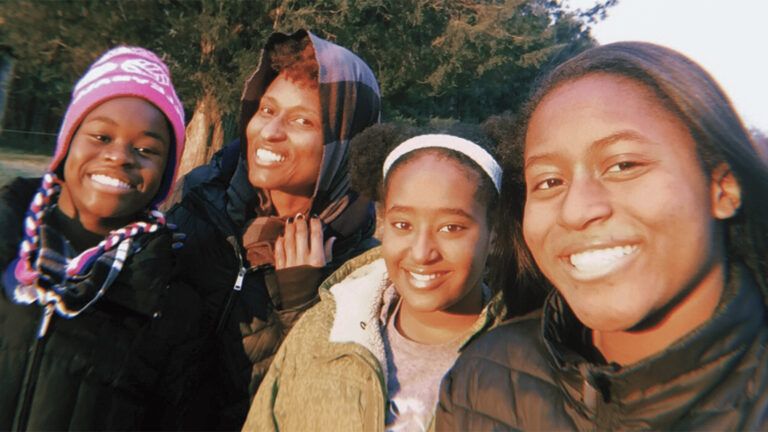Margaret Feinberg is one of the leading female voices in the evangelical world. In any given year, she can be found traveling the globe, giving talks to thousands of people, or at home, writing another best-selling book or Bible study — her collection now has sold nearly one million copies. The author and self-described “hot-mess” has an it-factor about her that makes readers want to devour her books the minute they go on sale and listen captively as she speaks at big-name Christian conferences. Maybe it’s her candor, the fact that she’s not afraid to talk about the things that matter openly and honestly. She opens all the way up in her new book Fight Back With Joy where she details her battle with breast cancer and how holding on to joy in her life was the best God-given medicine she could’ve recieved.
Fight Back With Joy isn’t just a “how-to” for people looking to rediscover the lost joy in their own lives, it’s the declaration of a woman whose eyes were finally opened to the little miracles all around her, despite the hardships she faced. Feinberg was kind enough to talk to Guideposts.org about why she chose to write the book and how she found joy even in the darkest of times.
Guideposts.org: Why a book on joy?
Margaret Feinberg: Almost three years ago, I came to a place in my life where I longed for more joy. I had heard the mantra “choose joy” and grown up with religious teachings that happiness is based on circumstance but joy is not. I determined it was time to pursue a joy-filled life. I decided to go on a quest to engage in practices that might nurture joy. The next year was spent looking for ways to pursue and activate joy through disciplines like watching my words, changing my attitude, and practicing gratitude.
Two weeks before I was supposed to turn in the manuscript to the publisher, I received the cancer diagnosis. I had been scouting for joy in the relatively good times of life, now I had to scour for it in the midst of darkness, depression, and torturous pain. No one signs up for that assignment. No one.
Through the process, I’ve discovered a breadth, depth, and power of joy—that despite hundreds of sermons and many decades in the church—no one had told me of before. Against all odds, I’ve found my capacity for joy expanding, and I’ve discovered something quite startling: joy is far more than I ever thought or have been taught. It’s a more dynamic, forceful weapon than most of us realize. When we fight back with joy, we lean into the very presence of God—the one who fills us with joy, even on our most deflated todays.
How did your battle with cancer influence you writing the book?
Cancer ruined my first book on joy. I tossed the manuscript away and began relooking at the more than 400 references to joy, happiness, delight, merriment, and more throughout the Bible. My lens of life had shifted dramatically, and now I began to see these passages in a whole new way. I learned to practice a defiant joy—the declaration that the darkness has not and will not win.
Get hope for Breast Cancer here
What are some things that bring joy in your own life?
Though God surrounds us with opportunities to experience joy, too often we sleep straight through. For me, joy crouches beside my bed as I offer my evening prayers. Joy beckons at sunrise and sunset, on afternoon walks and evening drives. Joy nestles on the couch as we open our homes to strangers, neighbors, and friends. Joy waits in our laughter and even our tears, our thank yous, and I love yous. We do not have to remain asleep to the joy all around. We can awake, toss back the covers, climb out of bed, and seize the fullness of life that God intended for us. We can live alert to good gifts of God all around.
How can others go about finding joy in their lives, even in the difficult times?
We need to be intentional about pursuing and activating joy during the smooth times of life. Don’t wait for crisis to put your dancing shoes on. Learn to practice thankfulness, throw mini-parties, and surprise people with kindness during uneventful times in life. Be intentional about nurturing joy by spending time with friends who leave you laughing so hard that the tears fall (in a variety of places!). Sing in the shower. Car dance during your commute. Sidle up to nieces and nephews, children and grandchildren. Most kids are bubbling with joy and can’t wait to share.
In the more difficult times, we need to practice a defiant joy. I did this in many ways. I remember having to go to the hospital knowing the next treatment was going to hurt more than the last. It was more than I could bear.
I found great comfort in the practice of keriah or the ripping of one’s clothing before a Jewish funeral. Some days I would go into my darkened bedroom, put on a blouse, and recite, “Blessed are You, Adonai our God, Ruler of the universe, the Judge of truth” based on the book of Job. Then I would rip the shirt. This provided a sanctioned expression of pain, anger, and deep grief. It dislodged roadblocks in my communication with God. A blockage to him was replaced with a newfound tenderness. In this prayer, in this act, I had, somehow, become more honest than ever with my pain and anger. My garment rent, I’d sit half-naked in the darkness, mended in some mysterious way.
What do you say to the person who might tell you, “I’ve tried all the tricks and I’m still not joyful. I just can’t get there?” Is joy really something you can conjure up?
I’d say your definition of joy is too narrow. So often the definitions of joy we hear make it elusive and just out of grasp. Joy is the sacred jingle of God within us. Such joy emanates out of the abiding sense that we are fiercely loved by God. Joy includes a spectrum of emotions, actions, and responses. Sometimes you feel like a joy, sometimes you don’t. But you can act in joy, respond in joy, move in joy even when feelings don’t line up perfectly. Throughout the Fight Back with Joy book and Bible study, I provide dozens of tactics from learning to rejoice when it makes no sense to how to throw the best party ever—even in the midst of horrible circumstances.
Your father was diagnosed with cancer around the same time you were, how did you remain positive and determined during that time?
About 100 days after I was diagnosed with cancer, my dad was diagnosed with cancer too. For months, I rode with him to radiation while he sat at the foot of my bed watching chemotherapy pumped into the veins. My mom had to watch her husband of 46 years and only daughter fight cancer side-by-side. Some days it just seemed like too much. But in my weakest moments, there’d be this scrappy sense of, “How can I fight back with joy in this?” Sometimes I’d nestle next to my dad and watch a comedy. Other days we’d take a walk together. We shared meals. We talked.
But do you know what happened? During those months, we had the sweetest moments, the most tender conversations. I heard my dad say, “I love you” more during those precious months than in my entire life. Today, he is doing much better and our relationship is more connected than ever.
What would you say to people who have family members or friends battling illness who might not know what to do or say to bring them joy?
You may feel ill-prepared and unequipped to enter into someone’s crisis. You tell yourself you don’t know the person that well. You count up the months and years since you lost touch. It feels strange, even foreign, to reach out now. You may even second-guess if it’s appropriate. What will the person or their family think? The reasons to remain silent pile high until you reach the ultimate:“I don’t know what to say.” Saying nothing seems better than saying the wrong thing. Or is it?
Just as your silence is one of the worst things you can give to someone facing hardship, your presence is one of the most meaningful, powerful things you can give. Remember that the person going through crisis or illness doesn’t need any pat answers, empty promises that they’ll “be fine,” or medical advice. They need you to be with them and for them.
Simply say, “Tell me what you need.” If they draw a blank face, let them know you have three ideas in mind. A gift certificate to their favorite restaurant. A night of babysitting. A free getaway to your family’s cabin. A pair of movie tickets. An afternoon of yard work. Remember that the needs of a person who is ill or in crisis are changing around the clock. So if you can come equipped with several unique suggestions (other than bringing over a meal), it can make a huge difference.
Are there any scriptures or stories from the Bible that really resonate with you and your joy mantra?
In 2 Chronicles 20, King Jehoshaphat finds himself surrounded by multiple armies and cries out to God. Verse 21 says, “Jehoshaphat appointed men to sing to the Lord and to praise him for the splendor of his holiness.”As they began to sing and praise, the Lord set ambushes, and their enemies were defeated. The Hebrew word for sing, rinnah, means “let out a ringing cry of joy.” They rejoiced. They literally took joy with them. They never stepped onto that battlefield empty-handed. And we don’t have to either. More than whimsy, joy is the weapon that we use to fight life’s battles. That’s why I wrote the book and Bible study, Fight Back With Joy.
Because if we’re honest, all of us are in a fight. Sometimes you pick the fight. Sometimes the fight picks you. Our struggles may differ, but no one escapes life unscathed. I know firsthand what it’s like to be on the battlefield.






